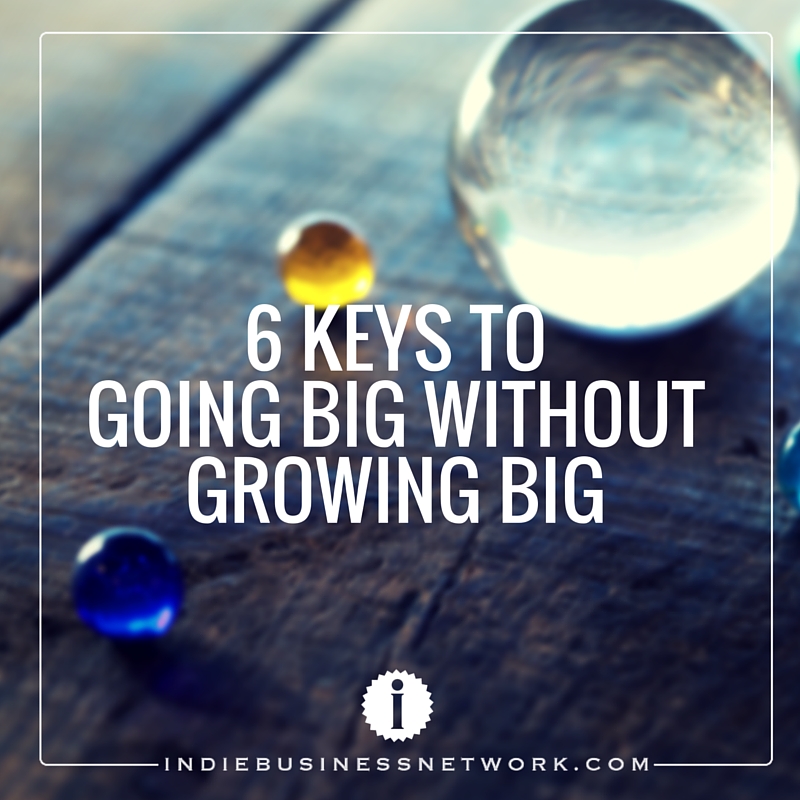When it comes to entrepreneurship, the saying “Go big or go home,” can be interpreted to mean that if your business if not big in size, then it somehow doesn't count. I disagree with that philosophy. Bigger doesn't necessarily mean better, and it sure doesn't mean stronger or more profitable. In fact, a business that is too big to for the leader to comfortably lead, and still have a meaningful personal life, is probably too big no matter what the size.

Over the years, I've had multiple opportunities to increase the size of the Indie Business Network. People have offered to sell me their businesses from time to time. I have also considered taking out loans to staff up and hire more people so the Indie Business Network could become bigger. While I admire people who choose to grow in size, I know it's not for me … at least not at this time in my life. And for me, that's OK.
Of course a business has to grow in order to be sustainable and profitable. But growth can happen in many ways — not just size. A business does not have to be big in order to do big things. You can go big without growing big, and here are 6 keys to doing so.
- Drill down into a niche.
If you want to your business to be a sustained, smashing success, but not be big in size, you must drill deep and not wide. Instead of catching millions of people in a wide net, catch thousands of people in a narrow net. Drilling down into a specific niche is not only a great way to become and remain profitable, but it's also a great way to make sure that you don't outgrow your ability to manage your business.
The riches are in the niches. If your don't have a niche, it will be nearly impossible to have a target customer.To drill down deep, you must know exactly what you sell, and exactly who your target customers are. You need to know why you do what you do, and you need to be able to articulate a solid and memorable back story that attracts your perfect customer.
The more specific you are about what you offer and to whom you are offering it, over time, the deeper you will drill your niche down into the rich kind of soil needed to sustain it for many years to come. This will support continued sales over time and give you the freedom and flexibility *not* to have to expand your business in order to sustain profitability.Become the undisputed BEST at one thing, and your niche will form itself. You won't ever be stressed to be all things to all people. When your perfect customer comes along, it's a match made in heaven. You exchange what you sell for cash. No drama. No haggling. Just business, satisfaction, and fun.
- Use multiple vendors and virtual assistance.
If you know exactly what you are selling, then you become adept at finding the supplies and the people you need to sell it. Find those supplies only, and make sure you have as many vendors as possible so if one runs out or closes, you are not left without what you need to produce whatever you sell. Avoid running off to track down the latest, greatest, new bright and shiny thing. Doing this will kill your sanity as well as any chance that you'll be able to intentionally and wisely manage the size of your business.Maintain a small group (as small as possible) of people who can perform tasks that you don't have to perform. For example, if you are a jewelry maker selling custom monogram cuff links for men (nice niche!), either hire a virtual assistant to answer customer service calls or set up a form or customer service desk at your website so you can easily manage inquiries. A help desk like Rhino Support or Zen Desk might be useful, or perhaps a real person you could hire through a virtual assistant service like Assist U. Either way, make it so you do the tasks that only you can do, and slowly delegate the rest to a few other systems or people. In this way, you can make more product so you can sell more product and have the time and energy to market and build your brand.It will also position you to become more a more exclusive Maker, so you can raise your prices, so you can make more money without having to grow so much in size.
- Minimize fixed expenses by working from a small space or from anywhere.
If you have the type of business, such as a manufacturing business, that requires you to make your products under certain manufacturing conditions, then find the smallest possible space to do that. You may even be able to find a co-op space like Blue Ridge Food Ventures located not too far from me, outside Asheville, North Carolina.
Whether you need a specific type of space or not, implement systems in your business that allow you to do as much of your work as possible from wherever you are.
Going on vacation, but need to work a bit too? Build in some work time so you don't fall behind on your blogging and newsletter marketing. Is there inexpensive co-working space near you? Arrange to work there a few times a month for a change of pace and to stay connected to your local entrepreneurial community. Are there local coffee shops with Wi-Fi? Use them. And work from home too. There are so many options that make it fun and easy for you to work from wherever you are, and none require you to hire people or sign the kinds of long term contracts that require you to grow beyond a size that's right for you. (Here's a little impromptu Facebook video I created to illustrate this point.)
- Resist bright and shiny things.
From time to time, you'll need the latest and the newest and the fastest and the hottest. Most times, you won't. What you must train yourself to do is to know *exactly* what you need and what you don't need for *your* business to thrive. If you know that, then when new things come along, you can measure them against what you know about your business.
“Does my business need this? Could my business benefit from this?” If the answer is yes, then stop and have a quick look. If you are not sure, bookmark it or save a note about it and come back on your next planning day to investigate. If it's not for your business, and you know that, then banish it from your brain, period.
Every moment spent on something that won't add to your bottom line is a wasted moment.
Don't let unnecessary stuff use up valuable brain cells. Get rid of what you don't need and work with what you need. You'll be happier, and you'll be able to go big without growing big.
- Add new revenue streams carefully.
Common sense dictates that new revenue streams will require you to grow, and if they are not carefully added to your business, they could result in growth beyond what you want.
I once worked with a woman who owned a very successful bath and body business. She made lotion bars in a variety of shapes and scents. Her line was small but consistent and very attractive to indie boutiques and spas. Her products were available online and her sales were growing steadily. She then decided to get into the wholesale market — nothing wrong with that. She started doing trade shows and became so successful that she had to stop selling direct to customers through her website. After a few years in business, she grew way beyond what she anticipated, and she realized she hated it. She had to hire people to help her make more products to meet the demands of thirsty retailers, which required her to buy more supplies, which required a bigger space to make products and store ingredients and inventory.
She had to hire more expensive accountants to handle the growing complexities of her business.
She had nearly no time with her kids, and lamented often that she wished she had just continued to work her online business and become known as the source for the world's most amazing lotion bars, without having to travel to trade shows and hire a bunch of people to make it all work together.
By the time she realized how miserable she was, she had hundreds of accounts and did not want to close down leaving them without products their customers had come to love. She eventually sold her business, so everything turned out for the best.
This is one of many similar stories of which I am personally aware. It highlights how important it is to resist becoming engaged in activities that will require you to grow in size if it's not what you want. You can make a lot of money without becoming a huge machine of a business, but you have to be intentional and focused tightly on what you do and on what makes the cash register ring.
- Practice saying “No, thank you, but here is how I can help …”.
Handmade entrepreneurs and Makers work from their heart. We want every encounter to end in a sale or a happy face. We hate to tell a prospective customer that we do not offer what they want, yet that's exactly what must happen if you want to remain in business and establish a strong niche at a size you can control.
Do not drop everything to order the supplies needed to give a single customer a bar of Lavender soap with gold glitter on top if that's not what you do.
You've got to say “No” to people who ask for things you do not offer. You can do this in a way that results in a positive encounter if, after saying “No,” you tell the person how you can help.
For example, you don't offer your sugar scrub in a Lemongrass scent, but you do have a Lemon Geranium variety. Or, maybe you don't offer sugar scrub at all, but you can share the contact information of a colleague who does.
Saying “No” feels one way. Saying “No, but here is how I can help,” feels different because the encounter remains positive even if it does not result in a sale for you. By becoming a resource, you make a positive impact by being helpful. You also pave the way to move quickly to the next person who *is* looking for what you have to offer.
Question: What is the right size for your business? Have you ever grown too big, and then had to dial things back? How are you going big without growing big? I'd love to hear your stories and feedback on this concept! Feel free to share in the comments below, or share on Facebook, Twitter, and LinkedIn.



